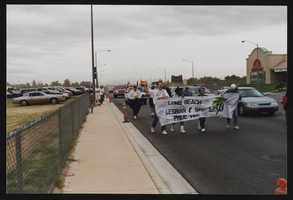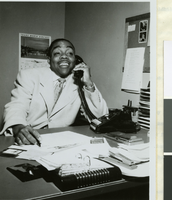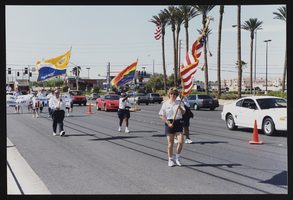Search the Special Collections and Archives Portal
Search Results
It's a Gay, Gay World, 2004
Level of Description
Archival Collection
Collection Name: Guide to the Canadian Film Centre Worldwide Short Film Festival Submissions
Box/Folder: Box 2004-035
Archival Component

Long Beach Lesbian and Gay Pride, Inc. in the second annual Gay Pride parade: photographic print
Date
Archival Collection
Description
Image
Audio recording clips of interview with Hazel Gay by Claytee D. White, December 2, 1995
Date
Archival Collection
Description
Interview with Hazel Gay conducted by Claytee D. White on December 2, 1995. Hazel and her husband Jimmy Gay moved to Las Vegas in 1946, becoming leaders in the African American community during the civil rights era.
Sound

Jimmy Gay at his desk: portrait photograph
Date
Archival Collection
Description
Black and white portrait photograph of Jimmy Gay working at his desk, dated 1946.
Image
#71259: Sean Clark, associate dean for research and sponsored projects on November 22, 2016, 2016 November 22
Level of Description
Archival Collection
Collection Name: University of Nevada, Las Vegas Creative Services Records (2010s)
Box/Folder: Digital File 01
Archival Component

Long Beach Lesbian and Gay Pride, Inc. in the third annual Gay Pride parade: photographic print
Date
Archival Collection
Description
Image
Frankie Perez oral history interview
Identifier
Abstract
Oral history interview with Frankie Perez conducted by Elsa Lopez and Laurents Bañuelos-Benitez on November 05th, 2018 for the Latinx Voices of Southern Nevada Oral History Project. Perez speaks about the importance of sports, and the lack of Latinx representation in teachers during high school. Perez then discusses being placed on medical hold in the military, how his transition affected his physical tests, how the 2016 election may have impacted transgendered people in the military, and how everyday military personnel feel about transgendered people serving in the military. The interview concludes with Perez discussing the Lesbian, Bisexual, Gay, Transgendered, and Queer (LGBTQ) scene in Las Vegas, Nevada and about how culture impacts which clubs members of LBGTQ community would visit.
Archival Collection

James A. Gay III interview, 1973: transcript
Date
Archival Collection
Description
Interview with James A. Gay III conducted by Joyce M. Wright in 1973. Edited by Elizabeth Nelson Patrick, and transcribed for the project "Black Experience in Southern Nevada, Donated Tapes Collection," James R. Dickinson Library, University of Nevada, Las Vegas, December 1978. Arriving in 1946 from Fordyce, Arkansas, Gay became the first African-American mortician in Las Vegas. He later worked as Assistant Manager of the Sands Hotel and Casino and Union Plaza while serving as an executive board member of the Culinary Union. Instrumental in the Las Vegas community, Gay worked to improved race relations, addressing social, economic, and civic issues. Gay was awarded an honorary degree from the University of Nevada, Las Vegas in 1988.
Text
J. K. Russ oral history interview
Identifier
Abstract
Oral history interview with J. K. Russ conducted by Claytee D. White on December 22, 2017 for the Remembering 1 October Oral History Project. In this interview, Russ discusses her early life in New Zealand and growing up on a tobacco farm. She remembers arriving to the United States and establishing a career as an artist. Russ talks about the 1 October shooting, creating an art exhibit using cards and letters received from people all over the world, and Las Vegas’ response to the tragedy. Lastly, Russ describes the art community in Las Vegas and the Arts District.
Archival Collection
